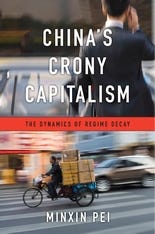China’s Crony Capitalism: The Dynamics of Regime Decay (Minxin Pei)

Minxin Pei is an exceptional observer of modern Chinese politics, although he tends toward the pessimistic. In his new book he has assembled a dataset of 260 major corruption cases involving officials at the highest levels, covering roughly the last 25 years.
There is no doubt that corruption is a major problem in China. Is it merely a quantitative impediment to efficiency, or an existential threat to the CCP regime? See also The truth about the Chinese economy.
Minxin Pei
When Deng Xiaoping launched China on the path to economic reform in the late 1970s, he vowed to build “socialism with Chinese characteristics.” More than three decades later, China’s efforts to modernize have yielded something very different from the working people’s paradise Deng envisioned: an incipient kleptocracy, characterized by endemic corruption, soaring income inequality, and growing social tensions. China’s Crony Capitalism traces the origins of China’s present-day troubles to the series of incomplete reforms from the post-Tiananmen era that decentralized the control of public property without clarifying its ownership.
Beginning in the 1990s, changes in the control and ownership rights of state-owned assets allowed well-connected government officials and businessmen to amass huge fortunes through the systematic looting of state-owned property—in particular land, natural resources, and assets in state-run enterprises. Mustering compelling evidence from over two hundred corruption cases involving government and law enforcement officials, private businessmen, and organized crime members, Minxin Pei shows how collusion among elites has spawned an illicit market for power inside the party-state, in which bribes and official appointments are surreptitiously but routinely traded. This system of crony capitalism has created a legacy of criminality and entrenched privilege that will make any movement toward democracy difficult and disorderly.
Rejecting conventional platitudes about the resilience of Chinese Communist Party rule, Pei gathers unambiguous evidence that beneath China’s facade of ever-expanding prosperity and power lies a Leninist state in an advanced stage of decay. Pei discusses his book at Stanford's Center on Democracy, Development, and the Rule of Law in the video below. Here is another video with an excellent panel discussion beginning 1 hr in.
This debate from a few years ago between Pei and venture capitalist / optimist / apologist Eric X. Li is very good. James Fallows is the moderator.



